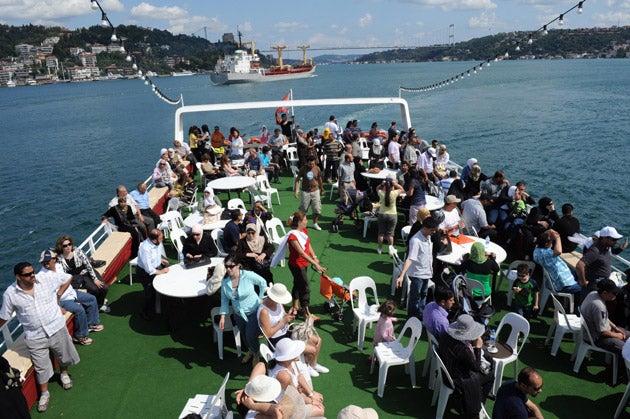Boyd Tonkin: On the waterfront in a fluid Istanbul
The Week In Books

Turkey has had an annual trade-based book fair for 28 years but, until this month, never an international literary festival. Now, with her team, the dynamic Nermin Mollaoglu of the Kalem agency has successfully made good that lack. Last week the first Istanbul Tanpinar Festival gathered more than 80 authors from 30 countries for events in bookshops, cafés, arts centres and campuses across the most eclectic and labyrinthine of all great cities. It even commandered a proper Sultan's palace - the Çiragan on the Bosphorus, now part of a luxury hotel - for the launch.
On a previous visit to meet Istanbul writers, I had registered that this unique metropolis will drown every cute generalisation in the fathomless depths of its heritage. Drop that weary cliché about a "bridge" between east and west, Europe and Asia, Islam and secular modernity... If you seek a watery metaphor for Istanbul (and autumn storms out of the Black Sea dumped floods on us last week), then think of the ferries that zigzag down the Golden Horn or along the Bosphorus, stopping off in neighbourhoods that can still feel almost like different countries.
True, so much of the old Ottoman diversity now survives more in buildings than in people. Many writers bitterly regret its loss, and seek in their work to restore it. I caught up with John Freely – author of a shelf of books on the city's past, and father of Maureen Freely, whose brilliant translations did so much to propel Orhan Pamuk towards his Nobel Prize – at an Armenian-run restaurant. "There are no Jews in the Jewish quarter," he was lamenting, "no Greeks in the Greek quarter, no Armenians in the Armenian quarter, no Roma in the Roma quarter..."
Outsiders sometimes find it hard to grasp that the ruling AK party, of former Islamists, feels far more comfortable about reviving the traditions of multi-cultural Ottoman Turkey than the old secular elite. Even the Kurds, their language denied for so long, now speak pretty audibly for themselves. Meanwhile, the Kemalists – loyal to the monotone nationalism of Atatürk, who built the nation out of the ruins of an empire – have their backs to the wall.
Events from the murder of the Turkish-Armenian writer Hrant Dink in 2007 through to the exposure of one army conspiracy after another have weakened the secular "deep state" and its claims to supervise democracy. For all the din among a crowd of fans outside the Besiktas football stadium, the real action last week was unfolding over the road at the Besiktas courthouse. Officers stood in the dock charged with a plot to undermine the government.
Liberal Turkish writers clearly prefer rule by a pluralistic "religious" party to the uniformed arrogance that drew up plans to assassinate Pamuk as well. Yet the old divisions can still ignite on the page. In chart-topping patriotic epics about the First World War and its aftermath such as Those Crazy Turks and Republic, the Kemalist novelist Turgut Özakman has charged into battle to defend Atatürk's secular nation. On the other side, and also selling well last week, Elif Shafak – author of The Bastard of Istanbul – revives a tolerant, rather mystical mindset in which a hundred flowers of thought can bloom. Her new novel Love, featuring both the medieval Sufi bard Rumi and 21st-century characters, is due in English soon.
Shafak had told me that – when it comes to language, religion, identity – "I don't want to choose". Istanbul's finest writers cherish the layer-cake complexity of their history, and resist polarising labels. In districts such as Balat, where headscarfed migrants from Anatolia glide through twisting lanes among dilapidated mansions once occupied by Greeks and Jews, this impacted past still speaks in varied voices. Hence the festival dedication to Ahmet Hamdi Tanpinar (1901-1962), the eccentric genius of Turkish letters who embraced every facet of his city and moved between its traditions. His heirs still cover the cultural waterfront, and visit every landing-stage along the way. Long may their engines turn.
P.S. On Tuesday, the auctioneers Bonhams sold the manuscript of a long-lost play – a court masque, in fact – written by the Jacobean poet Lord Edward Herbert in 1618 (left, Isaac Oliver's portrait of him). Herbert's aristocratic lineage allowed The Amazon to survive at the family seat, Powis Castle. But literary history abounds with mouth-watering disappeared dramas. What Faustian price would we pay to see Shakespeare and Fletcher's lost version of episodes from Don Quixote, Cardenio, turn up in a trunk? As for The Isle of Dogs, the "lewd" and "scurrilous" social satire that brought the law down like a ton of bricks on Ben Jonson and Thomas Nashe in 1597, its permanent absence means that a playwright should re-write it now that the Isle hosts Canary Wharf. These days, that sounds like a job for Mark Ravenhill rather than Sir David Hare.
b.tonkin@independent.co.uk
Join our commenting forum
Join thought-provoking conversations, follow other Independent readers and see their replies
Comments
Bookmark popover
Removed from bookmarks